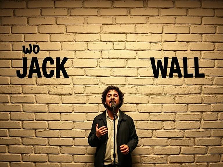
The Jack White Wall: Deconstructing the Fortress of Modern British Comedy
Alright, settle in. Grab a cuppa, maybe a biscuit. Today, we’re talking about something that’s puzzled search engines and sparked watercooler chats for years: the Jack White Wall. No, it’s not a new shade of Farrow & Ball, and it’s certainly not a forgotten Pink Floyd album. It’s something far more pervasive in British culture – it’s the phenomenon surrounding comedian, actor, writer, and all-round entertainment powerhouse, Jack Whitehall. That search term? It’s usually a delightful typo or a slightly misremembered name that accidentally stumbles upon the truth: Jack Whitehall has built something substantial, almost like a wall, within the landscape of UK comedy and beyond. He’s become an institution, a recognizable brand, a specific vibe.
Think about it. You know a “Jack Whitehall” moment when you see one. The posh boy slightly out of his depth, the self-deprecating charm masking sharp wit, the floppy hair and slightly-too-tight shirts. It’s a persona that’s evolved but remained remarkably consistent, creating a distinct boundary – a Jack White Wall, if you will – separating his brand of observational, slightly privileged, but ultimately warm-hearted comedy from the pack. For over a decade, he’s been omnipresent: panel shows, stand-up tours, hit sitcoms (Bad Education, anyone?), Hollywood films (Jungle Cruise, Clifford the Big Red Dog), travelogues with his dad (the legendary Michael Whitehall), and now, major presenting gigs. He’s not just a comedian; he’s a multi-platform entertainment engine.
But what is this wall made of? How did he construct it? And crucially, as we cruise through 2025, is it starting to show cracks, or is it reinforced steel? That’s what we’re here to unpack. Forget dry analysis; let’s talk about the man, the myth, the accidental architectural marvel of modern British humour. We’ll explore the bricks and mortar of his success, the controversies that have chipped away at the facade, and why, despite it all, the Jack White Wall remains a dominant feature in the comedy skyline. Strap in.
Laying the Foundation: The Bricks of the Whitehall Persona
Every solid structure needs a strong foundation. For Jack, this was laid early, though perhaps not in the way you’d expect for a comedian. Born into significant privilege (his father is a formidable theatrical agent, his mother an actress), Jack’s upbringing was far removed from the gritty, working-class roots often associated with British comedy greats. Rugby School, University of Manchester – this wasn’t the comedy club toilet circuit grind in the traditional sense. But here’s the twist: this background became his material. It was the foundation.
Instead of running from the “posh boy” label, Jack leaned into it, hard. He weaponized his own privilege and awkwardness. His early stand-up was a masterclass in self-aware, upper-middle-class angst. Jokes about struggling with basic life skills, disastrous attempts at being “down with the people,” and hilariously uncomfortable interactions became his stock-in-trade. Audiences, both those who recognised aspects of themselves and those who enjoyed laughing at that world, connected. He wasn’t mocking others from that background; he was mocking himself, and by extension, the absurdities of that bubble. This authenticity, this willingness to be the butt of the joke rooted in his genuine experience, was the first crucial brick in the Jack White Wall.
The second foundational brick was sheer, undeniable work ethic and versatility. While the persona was crystallizing, Jack wasn’t waiting around. He was everywhere. Student comedy awards led to Edinburgh Fringe shows, which led to panel show appearances (8 Out of 10 Cats, Would I Lie To You?, A League of Their Own). He wrote and starred in the massively successful BBC sitcom Bad Education while still in his early 20s, showcasing his acting chops and writing talent. He presented awards shows. He did voice work. This relentless hustle wasn’t just about fame; it was about building a multifaceted career where comedy was the core, but the applications were endless. He wasn’t just building a wall; he was building an entire entertainment complex. By the mid-2010s, seeing Jack Whitehall on your telly was as predictable (and often as welcome) as rain in April – he was a fixture.
The Mortar: Charisma, Timing, and the “Michael Factor”
A wall needs more than bricks; it needs mortar to hold it together. For the Jack White Wall, that binding agent is Jack’s undeniable charisma and impeccable comedic timing. Watch him on a panel show: he has an innate sense of when to jump in with a withering one-liner, when to play the flustered innocent, and when to let someone else shine (though he’ll often sneak in the punchline anyway). His delivery – that slightly high-pitched, rapid-fire posh cadence – is instantly recognisable and perfectly calibrated for both embarrassment and punchlines. He makes being hapless look charming.
Then there’s the secret weapon, the unexpected reinforcing rod in the structure: his dad, Michael Whitehall. The Travels with My Father Netflix series (which concluded its final season in late 2024, much to fans’ dismay) wasn’t just a hit; it was a revelation. It showcased a dynamic that became comedy gold: the eternally exasperated, old-school, impeccably dressed Michael versus the energetic, slightly ridiculous, modern Jack. Their genuine (if sometimes strained) affection shone through the bickering and cultural clashes. This series did something remarkable: it humanised Jack beyond the “posh twit” persona. We saw vulnerability, familial love, and frustration. It added a layer of depth and relatability that pure stand-up or scripted comedy couldn’t achieve. Suddenly, the Jack White Wall wasn’t just a facade; it had windows into a real, complex relationship. This “Michael Factor” significantly broadened his appeal, especially internationally.
Raising the Structure: Diversification and Mainstream Domination (2015-2025)
Once the foundation was solid, the Jack White Wall didn’t just stay put; it expanded upwards and outwards. The late 2010s and early 2020s saw Jack strategically diversify, moving far beyond the initial comedy stronghold into mainstream entertainment dominance. This phase was about proving he wasn’t a one-trick pony.
-
Hollywood Calling: Landing roles in major studio films like Disney’s Jungle Cruise (alongside Dwayne Johnson and Emily Blunt) and Clifford the Big Red Dog was a significant leap. While reviews for the films themselves were mixed, Jack’s performances were often highlighted for their comedic charm and energy. He held his own alongside massive stars, proving his appeal translated across the pond. These weren’t just paychecks; they were global brand-building exercises, plastering his face on billboards worldwide and adding a new “blockbuster comedian” layer to the wall.
-
Presenting Powerhouse: Jack transitioned seamlessly into high-profile presenting roles. Hosting the BRIT Awards multiple times (most recently in 2024) cemented his status as a safe, witty, and bankable pair of hands for live TV. His ability to handle the unpredictable nature of live awards shows, ad-lib through mishaps, and deliver scripted gags with polish showcased a different facet of his talent – the consummate professional entertainer. Similarly, his stint hosting the revival of The Great British Bake Off: An Extra Slice demonstrated his ability to engage with a very different, gentler kind of show.
-
Stand-Up Evolution: Crucially, he never abandoned stand-up. Tours like Stood Up (massive arena success) and Settle Down (exploring themes of impending fatherhood and maturity) showed growth. The material evolved alongside his life – less about being a clueless posho, more about navigating relationships, societal expectations, and his changing place in the world, all while retaining that core self-deprecating Whitehall humour. His 2025 tour, reportedly titled Equilibrium (though dates are still under wraps), is highly anticipated to reflect on his journey into parenthood, a topic guaranteed to mine comedic gold from his established persona.
Weathering the Storms: Cracks in the Facade?
No structure stands forever without facing some weather. The Jack White Wall has certainly endured criticism and controversy that have threatened to chip away at its facade. The most persistent critique is the “posh boy” label evolving from a comedic device into a perceived limitation. Detractors argue his comedy relies too heavily on class-based stereotypes he embodies, and that his perspective, however self-mocking, remains inherently privileged. Questions arose: Is his success partly down to industry connections (thanks, Dad)? Does he truly represent a diverse modern Britain?
Specific controversies also hit:
-
Casting Backlash: His casting as a gay character in the 2020 film The Politician (a role he later dropped out of) sparked debate about straight actors taking LGBTQ+ roles, especially when those roles involve specific cultural experiences. While he handled the withdrawal gracefully, it highlighted a sensitivity he perhaps hadn’t fully navigated before.
-
“Lad Banter” Fatigue: Some routines, particularly older ones or off-the-cuff panel show remarks, have occasionally been criticised for veering into outdated “lad banter” territory or punching down, even if unintentionally. In the more socially conscious landscape of 2025, such moments are scrutinized intensely.
-
The “Over-Exposure” Factor: For a period, his ubiquity led to a minor backlash. The phrase “Jack Whitehall fatigue” was muttered in some corners. Could the wall withstand being everywhere all at once?
Jack hasn’t been deaf to these critiques. His more recent stand-up and interviews show a noticeable effort to address privilege more thoughtfully and broaden his comedic scope. His role in the critically acclaimed 2024 drama-comedy series The Undoing Project (playing against type as a neurotic academic) was a conscious step towards demonstrating dramatic range and moving beyond the expected. He seems aware that maintaining the wall requires renovation and adaptation, not just constant repainting in the same colour.
The Jack White Wall in 2025: Renovation, Not Demolition
So, where does the Jack White Wall stand today, mid-2025? Is it crumbling under the weight of criticism and changing tastes? Far from it. It’s undergoing a significant, fascinating renovation. The core structure – the charisma, the work ethic, the comedic timing – remains incredibly strong. But the content and presentation are evolving.
-
Fatherhood & Maturity: The biggest shift is personal. Jack becoming a father in late 2023 has fundamentally altered his life and, inevitably, his material. Early glimpses in interviews and small gigs suggest this is fertile ground. Imagine the classic Whitehall floundering, but now applied to nappies, sleep deprivation, and the terrifying responsibility of parenthood, all filtered through that privileged-yet-clueless lens. It’s relatable on a whole new level. This evolution promises to refresh his stand-up significantly and adds a new layer of vulnerability and warmth.
-
Deeper Dives: Projects like The Undoing Project indicate a desire to be taken seriously beyond pure comedy. While he’ll never abandon making people laugh, exploring more nuanced characters demonstrates artistic growth and a bid for longevity that isn’t solely reliant on the “posh boy” shtick. It shows the wall can have different textures and architectural styles.
-
Strategic Selectivity: He seems more selective now. Less frantic ubiquity, more focused projects. This helps combat over-exposure fatigue and allows each appearance or project to feel more significant. The upcoming Equilibrium tour is a prime example – highly anticipated precisely because he hasn’t been saturating the market.
The Enduring Blueprint: Why the Wall Still Stands
Despite controversies and necessary evolution, the Jack White Wall endures for fundamental reasons:
-
Relatability (in Disguise): While his specific background isn’t universal, the feelings he mines are: social awkwardness, trying to fit in, generational clashes, fear of failure, the absurdity of modern life. He taps into universal anxieties through a very specific, but vividly drawn, lens.
-
Pure Entertainment Value: At his core, Jack Whitehall is a supremely gifted entertainer. He knows how to deliver a joke, command a stage, hold an audience, and make people laugh consistently. That raw talent is undeniable and forms the strongest part of the foundation.
-
Adaptability: From panel show banter to arena stand-up, sitcom writing to Hollywood blockbusters, travelogues to drama, he has shown a remarkable ability to adapt his core skills to different formats. The Jack White Wall isn’t a monolith; it’s a versatile structure.
-
The Human Connection: Underneath the persona, glimpses of genuine warmth, especially in his interactions with his father or when discussing his own family, resonate. People don’t just laugh at him; they often laugh with him, feeling a connection.
Conclusion: More Than Just a Typo
So, the next time you see “Jack White Wall” pop up in a search bar, remember: it’s more than just a misspelling. It’s an accidental metaphor for a unique and enduring phenomenon in British entertainment. Jack Whitehall constructed a formidable presence – a Jack White Wall – built on self-deprecating charm, relentless hustle, undeniable talent, and a specific brand of humour that initially defined him by his privilege but is increasingly defined by his humanity and evolution.
Has the wall faced weathering? Absolutely. Criticisms about privilege and occasional comedic missteps are valid parts of his story. But in 2025, the structure isn’t collapsing; it’s being thoughtfully renovated. Fatherhood is adding new rooms. Selective dramatic roles are adding different facades. His core comedic talent remains the load-bearing beam.
The Jack White Wall stands not because it’s impenetrable or unchanging, but because its foundations in entertainment value and relatability (however specific) are deep, and its architect is skilled enough to keep adapting the design for the times. Whether he’s making you cringe, laugh out loud, or even surprising you with depth, Jack Whitehall remains a defining feature of the cultural landscape. And honestly? I can’t wait to see what he builds next on that plot. The renovation looks promising.
FAQs: Demystifying the Jack White Wall
-
Wait, so “Jack White Wall” isn’t a real wall? What is it really?
Haha, nope, no physical wall involved (though maybe a metaphorical one!). It’s almost always a typo or mishearing of comedian and actor Jack Whitehall’s name. But the reason it sticks and gets searched is because his persona and career feel so distinct and solid, like a recognizable structure in comedy – hence, the “wall” idea kinda makes sense accidentally!
-
Okay, got it. But why is Jack Whitehall famous? What’s his deal?
Jack blew up initially by being the hilarious “posh boy” who made fun of himself and his privileged upbringing. Think floppy hair, awkward stories, and brilliant self-deprecation. He then got everywhere: massive stand-up tours, hit sitcom Bad Education, loads of panel shows (WILTY?, ALOTO), Netflix travel shows with his grumpy dad (Travels with My Father), and even big Hollywood movies (Jungle Cruise). He’s basically a comedy and entertainment machine!
-
People seem to either love him or find him annoying. What’s the controversy about?
Fair point! The criticism mainly centres on two things: First, some feel his comedy relies too much on the posh stereotype, even if he’s mocking it. Does it get old? Does it ignore other perspectives? Second, there have been specific blips, like casting backlash for a gay role he stepped away from, or occasional jokes that felt a bit “laddy” or out-of-step. He’s definitely faced questions about privilege and relevance, especially as comedy tastes evolve.
-
Is he still relevant in 2025? What’s he doing now?
Absolutely! He’s evolving. Becoming a dad in late 2023 is a huge deal – expect loads of new stand-up material about parenthood chaos (his 2025 tour is hotly anticipated). He’s also doing more dramatic acting (check out The Undoing Project in 2024) showing different sides. He’s maybe a bit more selective now, focusing on bigger projects like hosting the BRITs or his tours, rather than being on every panel show. The Jack White Wall is getting a 2025 renovation!
-
What’s the deal with him and his dad? Is that show real?
Oh, Michael! Travels with My Father is a Netflix goldmine. While definitely played up for cameras, the core dynamic is real: posh, old-school, utterly exasperated Michael vs. energetic, slightly ridiculous Jack. Their genuine (if often frustrated) affection shines through, and it became a massive hit, making Jack seem way more relatable and human. It’s a huge part of why his appeal broadened so much. They wrapped the final season late 2024 – end of an era!






